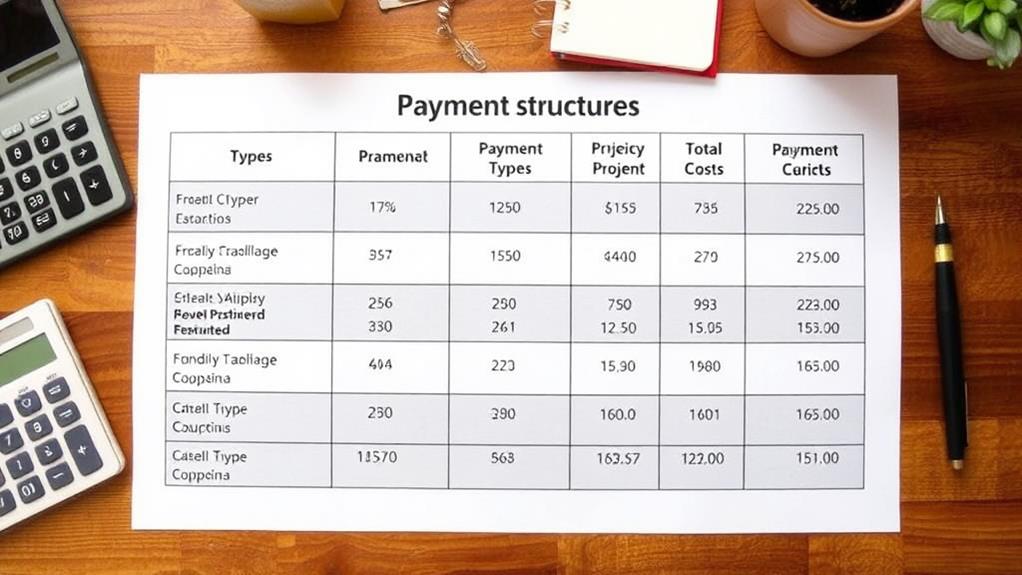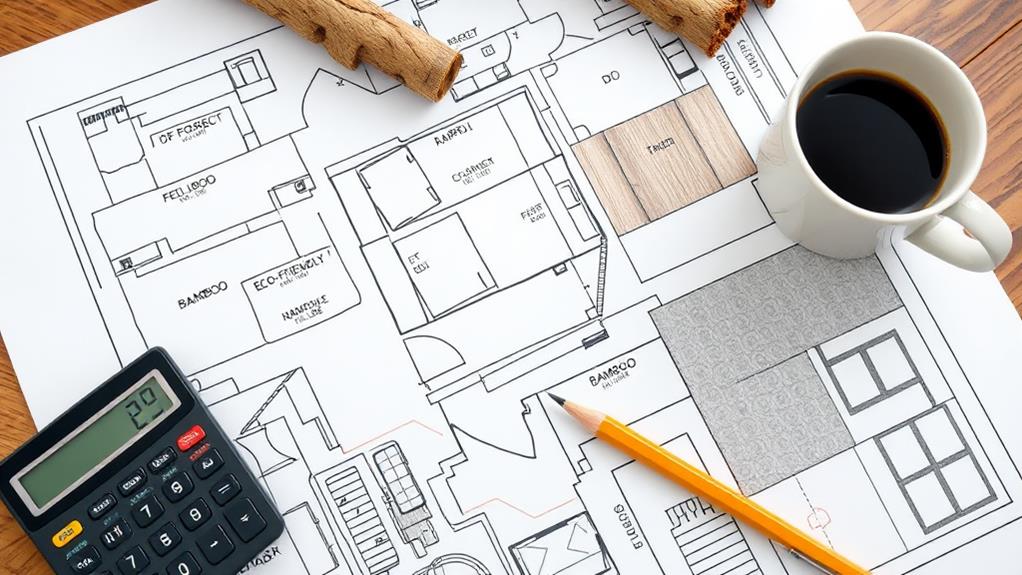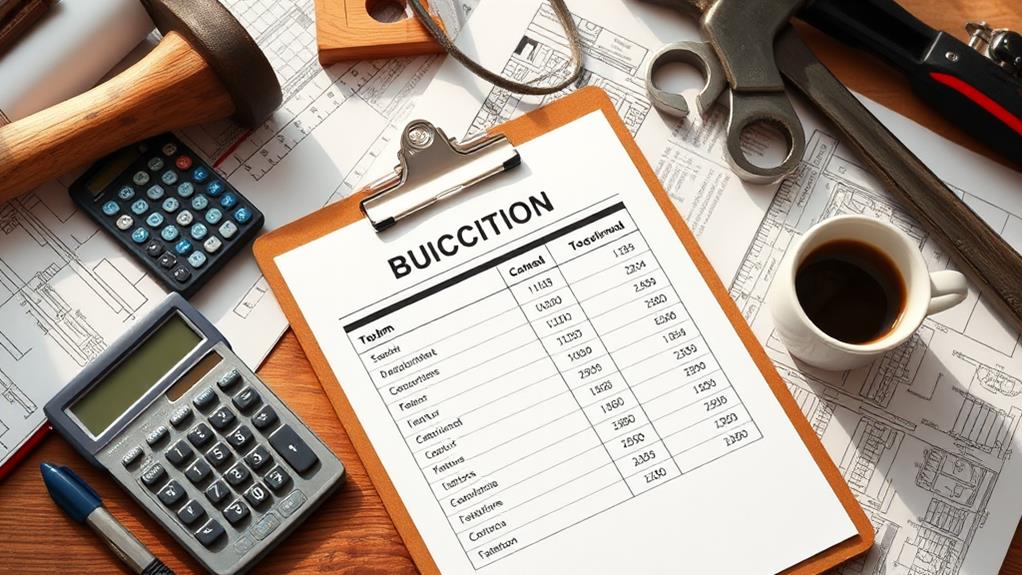When looking for budget-friendly cost estimates for local contractors, it's important to evaluate several factors. Generally, hiring a contractor costs between $800 and $2,212, with larger projects escalating costs considerably. Be mindful of markup rates, which usually add 10% to 30% to project expenses. Always compare quotes from multiple contractors to get the best deal, and request detailed estimates that break down labor and material costs. Additionally, budgeting for permits, which can average around $1,200, is vital. You can save more by negotiating timelines and exploring DIY options for simpler tasks. You'll find even more tips to help you stick to your budget.
Understanding General Contractor Costs

When you're considering a renovation or building project, understanding general contractor costs is essential for budgeting effectively. The average cost to hire a general contractor ranges from $800 to $2,212, with a national average around $1,500. Knowing these figures can help you plan your project's budget.
General contractor rates typically include a markup of 10% to 30% on project costs, covering necessary overhead expenses like insurance and salaries.
When hiring a general contractor, you might encounter fixed bid contracts that provide a clear cost estimate upfront. This approach can help manage your budget expectations from the start. Although average hourly rates are around $50, many projects are quoted on a per-project basis, making it easier to understand total costs.
It's important to remember that costs can rise considerably depending on the size and complexity of your project. For instance, larger projects, such as homes between 1,500 and 2,000 square feet, average around $56,110.
Utilizing construction estimating services can also give you a better understanding of potential costs, ensuring you're informed before you begin your project.
Factors Affecting Cost Estimates
Understanding the factors that influence cost estimates is key to managing your renovation or building project effectively. Several elements can greatly impact the overall cost, so it's crucial to take these into account before moving forward.
To find reliable local contractors who can provide accurate estimates, it's important to do thorough research.
- Scope of Work: The larger and more complex your project, the higher the costs will likely be.
- Labor Rates: Depending on your location, labor costs can vary, especially in urban areas where demand is higher.
- Material Costs: The types of materials you choose can drastically affect the total cost of your project.
- General Contractor Experience: More experienced general contractors may charge higher fees, but their expertise can save you money in the long run.
Each of these factors contributes to the average contractor service cost, which typically ranges between $800 and $2,212.
Additionally, contractor markups, usually between 10% and 30%, cover overhead expenses like insurance and labor.
Breakdown of Payment Structures

Maneuvering payment structures can make a significant difference in your renovation experience. Many contractors request payment upfront for materials, usually limited to 10% of the total project cost or a maximum of $2,000. This legal limit helps protect you as a homeowner.
Payment plans are also popular; they're structured around project milestones, allowing you to pay as the work progresses and guaranteeing you stay within budget.
Typically, contractors charge a project management fee ranging from 10% to 20% of the overall project cost. This fee is included in your initial estimates, so it's important to factor it into your budget.
When hiring a contractor, ask about payment options, as some contractors offer payment plans that can make financial management easier.
To avoid misunderstandings and guarantee satisfaction, maintain clear communication regarding payment terms. Discuss the cost of materials and any additional fees that may arise, like permits and licenses, to avoid surprises.
Navigating Permits and Fees
Securing the right permits is an essential step in any renovation project, especially if your plans involve plumbing or electrical work.
When handling permits, you need to understand that obtaining building permits is vital for compliance with local building codes. Permit costs vary greatly and can range from $50 to over $2,000, with the average cost around $1,200. Some permits might even exceed $7,500, depending on the project's scope and location.
Be mindful of the additional fees that may come with permits, which typically add a percentage markup of 10% to 20% on your overall job total. Failing to obtain necessary permits can lead to costly code violations and delays in your project.
To help you manage this process effectively, consider these points:
- Research local building codes for your area.
- Budget for permit costs in your overall project estimate.
- Factor in additional fees when planning your finances.
- Stay organized with permit applications to avoid delays.
Strategies for Budget-Friendly Projects

When you're planning a budget-friendly project, consider taking on some DIY tasks to save on contractor costs, while still hiring professionals for more complex jobs.
Efficiently sourcing materials can also make a significant difference in your overall expenses, so research different suppliers to find the best deals.
DIY Cost-Saving Tips
With a little creativity and effort, you can tackle budget-friendly DIY projects that not only save you money but also give you a sense of accomplishment.
Here are some tips to help you maximize your savings while completing your projects:
- Sourcing your own materials instead of relying on contractors can eliminate markups, saving you 10% to 20% on material costs.
- Take on DIY tasks like site preparation or painting. This can greatly reduce labor costs, allowing you to spend more on specialized contractor services if needed.
- Create a detailed project budget that includes a 10-15% contingency for unexpected expenses. This helps guarantee you stick to your financial limits throughout the project.
- Research and compare multiple contractors for quotes. Costs can vary widely based on location and project scope, so getting multiple estimates can lead to better deals.
Additionally, don't hesitate to negotiate flexible project start dates. Contractors might offer discounts during their off-peak seasons, allowing you to save even more.
Efficient Material Sourcing
Maximize your savings by sourcing materials efficiently for your DIY projects. Start by connecting with local suppliers. This not only reduces transportation costs but can also lead to bulk discounts, saving you up to 15% on total material expenses.
When you explore your options, consider utilizing reclaimed or recycled materials. This choice contributes to sustainability and can lower costs by up to 20% compared to new materials.
To guarantee you're getting the best deals, compare prices from multiple vendors. Remember, material costs can fluctuate based on market conditions and local availability. Establishing strong relationships with suppliers can also be beneficial; it may lead to negotiated rates or loyalty discounts, potentially saving you thousands over multiple projects.
Additionally, consider using online platforms or apps that aggregate supplier prices. These tools can streamline your material sourcing process and help you quickly identify competitive pricing.
Comparing Quotes From Contractors
When you compare quotes from contractors, it's essential to look for detailed estimates that break down material and labor costs.
This helps you spot any variations and understand what you're really paying for.
Plus, knowing how to negotiate can save you money, making it easier to stick to your budget.
Importance of Detailed Estimates
Detailed estimates from contractors are essential for ensuring you have a clear understanding of your project's costs. When you request a detailed estimate, you're not just looking for a bottom-line figure; you want a breakdown of labor, materials, and potential hidden costs. This transparency helps you estimate the cost accurately and avoid surprises down the line.
Here are some key elements to look for in a detailed estimate:
- Labor Costs: Understand what contractors charge for their time and expertise.
- Materials: Get a clear list of materials needed, including quality and quantity.
- Permits: Know any necessary permits, which can range from $50 to over $2,000.
- Payment Structures: Review any payment structures, ensuring upfront payments stay within legal limits.
Moreover, comparing estimates from multiple contractors can reveal significant variations, particularly in project management fees, which typically range from 10% to 20% of the total cost.
Analyzing Quote Variations
Understanding the variations in contractor quotes is key to making informed decisions for your project. When you're analyzing quote variations, it's essential to get a detailed breakdown of labor, materials, and any extra fees. This transparency helps you identify pricing differences that can impact your overall project costs.
Contractor rates are typically influenced by the scope of your project. For instance, a larger renovation can average around $10,000 or more, owing to increased material and labor needs.
Remember that general contractors often charge a markup of 10% to 20% on project costs, so evaluate whether their rates seem competitive.
Don't forget to factor in permit costs, which can range from $50 to over $2,000. These expenses should be included in contractor estimates to guarantee you're comparing quotes accurately.
It's advisable to compare quotes from multiple contractors, especially when specialized services are involved, as these can lead to significant differences in the total cost of hiring. By carefully analyzing these variations, you'll be better equipped to choose the right contractor for your project without overspending.
Negotiation Strategies for Savings
Comparing quotes from contractors can help you uncover potential savings and make informed choices for your project. To get the best deal, follow these strategies:
- Request Detailed Estimates: Make certain that each estimate includes a breakdown of labor and material costs. This clarity allows you to spot areas for negotiation.
- Gather Multiple Quotes: Aim for at least three estimates from different contractors. This variety helps you understand the market rate and can highlight significant cost differences.
- Be Open About Your Budget: Share your financial constraints with contractors. They may be willing to offer discounts or flexible pricing options to fit your needs.
- Negotiate Timelines: Discuss potential project timelines. If you can be flexible with start dates, contractors might offer savings for work during their off-peak seasons.
Don't forget to address any change orders upfront. Knowing how these can impact costs will help you avoid unexpected expenses later.
Conclusion
In summary, traversing the world of contractor costs doesn't have to feel like wandering through a maze. By understanding the factors that influence estimates, comparing quotes, and planning for permits, you can find a path that fits your budget. Think of your project as a puzzle, where each piece—like payment structures and strategies—helps create a complete picture. With careful planning and research, you can build your dream project without breaking the bank.


Leave a Reply